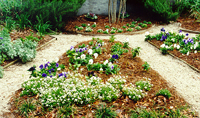IOP Therapy Garden helps to cope, relax
by Donna BaileyPublic Relations
 A
portion of the Therapy Garden is planted and maintained by staff and patients
of the Institute of Psychiatry.
A
portion of the Therapy Garden is planted and maintained by staff and patients
of the Institute of Psychiatry.
The Charleston Garden Club has been good medicine for the Institute of Psychiatry Therapy Garden since its opening two years ago.
The program has been so successful, the garden club has joined in whole heartedly in allowing activity director Robert Raynor financial freedom to continue planting and growing.
Ann Payne, an MUSC employee, is a member of the Charleston Garden Club. She approached Raynor when the therapy garden was first coming together. “Nationally, the Charleston chapter participates in what we call the healing gardens program,” said Payne. “This deals with the emotional part of gardening, getting out and digging in the dirt.”
Each year, the club has given $1,000 in support of the garden project. The recreation therapy staff has kept in constant communication with them, providing photos and tours for interested garden club members nationwide. “By keeping the doors of communication open, it has shown them how grateful we are for their interest,” said Raynor. “I think that has been what has created such a special relationship between us.”
In the past two years, trees and perennials that were planted have thrived; bringing to life the planned shady area called the quiet garden. The area receiving the most sun is the working garden and is divided into sections for different therapy groups to create and maintain.
He feels that patients will benefit from the outdoors and the connection with nature, hopefully valuing the gardening process for coping and relaxation. While contributing positive energy to the therapy garden, patients will be able to generalize garden metaphors to their own lives.
“We have heard some interesting comments from patients working in the garden,” said Raynor. “One patient was reminded while raking and smoothing a small walk way, that he had really let things go at home and there was a lot he needed to take care of.”
“When things aren’t going well and are dysfunctional, this is a way to put that positive energy to work and nurture,” said Raynor.
To celebrate the 10-year anniversary of the Institute of Psychiatry, the garden club contributed an arbor that now separates the quiet garden from the working garden. Plans have already been made to add a fountain to the quiet garden. With help from the club and the positive energy from the patients, the therapeutic gardening program can only grow and thrive.
“We get all kinds of discoveries and surprises in the garden,” said Raynor. “Plants as well as people.”